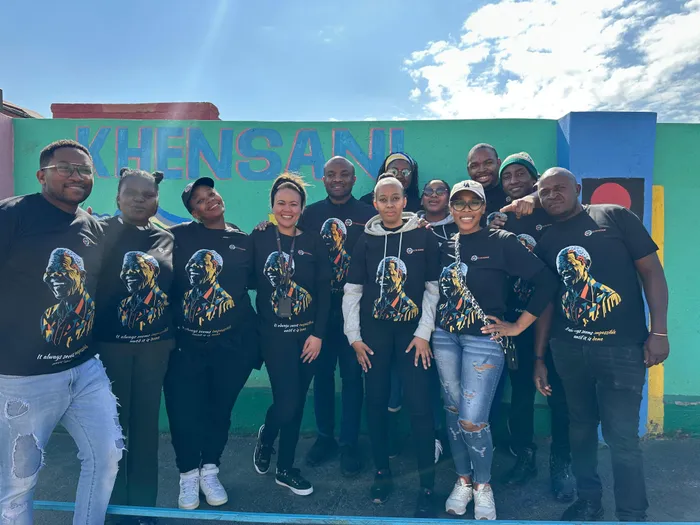Mandela Day in the township, rural areas: How local entrepreneurs powered grassroots growth
22 ON SLOANE

The 22 On Sloane team during their 67 minutes on Mandela Day at a day care centre in Tembisa.
Image: Supplied
While many South Africans observed Mandela Day last Friday, July 18, with symbolic gestures of service, in townships and rural communities across the country, entrepreneurs marked the day by actively contributing to economic upliftment and community development.
In areas often overlooked by formal investment, township and rural entrepreneurs have long been creating jobs, building networks, and strengthening local economies through small but impactful enterprises. Mandela Day this year amplified the ongoing efforts of these business owners, who used the occasion to give back in meaningful ways.
Across Limpopo, small-scale bakeries hosted bread-making workshops to teach unemployed youth practical skills, helping them generate income with limited resources. These workshops offered more than baking techniques — they provided a pathway to financial independence and a source of hope for communities grappling with unemployment.
In Cape Town townships, digital platforms supporting informal traders offered free training sessions focused on pricing strategies, inventory management, and mobile payment systems. These initiatives empowered local shopkeepers to run more sustainable operations and compete effectively in increasingly digital markets. For many informal traders, this was a chance to upgrade business skills that are often out of reach due to lack of access or resources.
Meanwhile, in rural villages, social enterprises manufacturing eco-friendly sanitary products distributed free packs to schoolgirls and held open forums on menstrual health. These efforts addressed a critical challenge in underserved communities, where menstrual hygiene remains a barrier to school attendance and personal dignity. By combining business with social impact, these entrepreneurs contributed to breaking stigma and promoting awareness.
Adding to the day’s spirit of service, several businesses stepped away from their office desks to roll up their sleeves and support early childhood centres in under-resourced communities. From assembling jungle gyms to donating educational toys, art supplies, and outdoor play equipment, these contributions created joyful spaces for children to thrive. Rather than making symbolic gestures, these teams spent the day meaningfully — reading to little ones, painting classrooms, and restoring safe, playful environments where children can learn and grow. The gesture also spotlighted the ongoing need for essentials like puzzles, soft play mats, learning posters, and cleaning materials in many local creches.
These initiatives reflect a powerful blend of entrepreneurship and social responsibility. They highlight a growing segment of South Africa’s economy driven by resourcefulness, impact, and deep community connections. Mandela Day served as a reminder that grassroots entrepreneurs are vital to inclusive growth, particularly in regions facing high unemployment and limited opportunities.
The entrepreneurial efforts on Mandela Day underscored a shift in how business success is measured — not solely by profits, but by the positive ripple effects on communities. This approach aligns closely with the legacy of Nelson Mandela, who championed equality, dignity, and opportunity for all.
What stood out this year was the understanding that community-oriented entrepreneurship is not just about business but a social mission. These ventures operate with limited resources but make significant strides in meeting local needs, exemplifying what many call the evolution of the informal economy, now increasingly supported by digital tools and local partnerships.
For aspiring entrepreneurs, particularly those starting with minimal capital, these stories offer a valuable lesson: a physical office or large investment is not a prerequisite for success. With a mobile phone, an understanding of community needs, and a commitment to solving real problems, entrepreneurship remains accessible and impactful.
Furthermore, these grassroots initiatives demonstrate that entrepreneurship can be a powerful force for social cohesion and resilience. By creating employment and sharing knowledge within their communities, these business owners help build a stronger economic foundation and inspire future generations to pursue their own ventures.
As South Africa’s business landscape evolves, township and rural entrepreneurs are proving they are not on the margins but at the heart of economic renewal and community empowerment.

Tsakani Nkombyane, Programme Officer at 22 On Sloane.
Image: Supplied.
Tsakani Nkombyane is the Programme Officer at 22 On Sloane
*** The views expressed here do not necessarily represent those of Independent Media or IOL.
BUSINESS REPORT